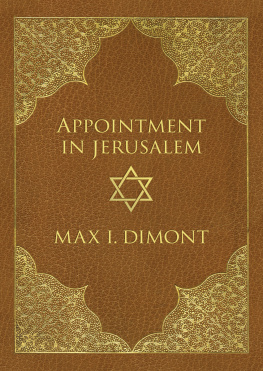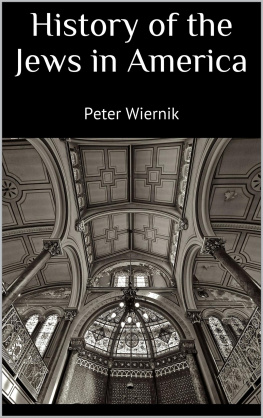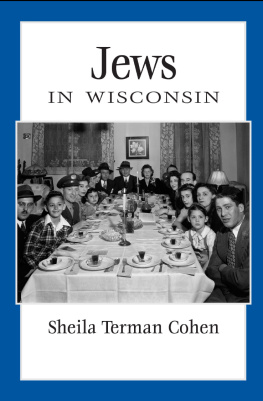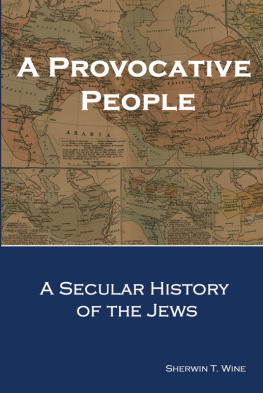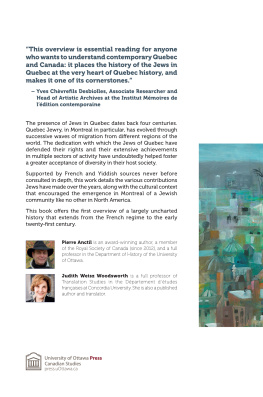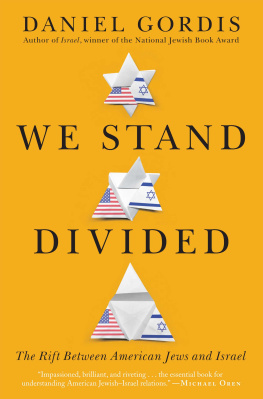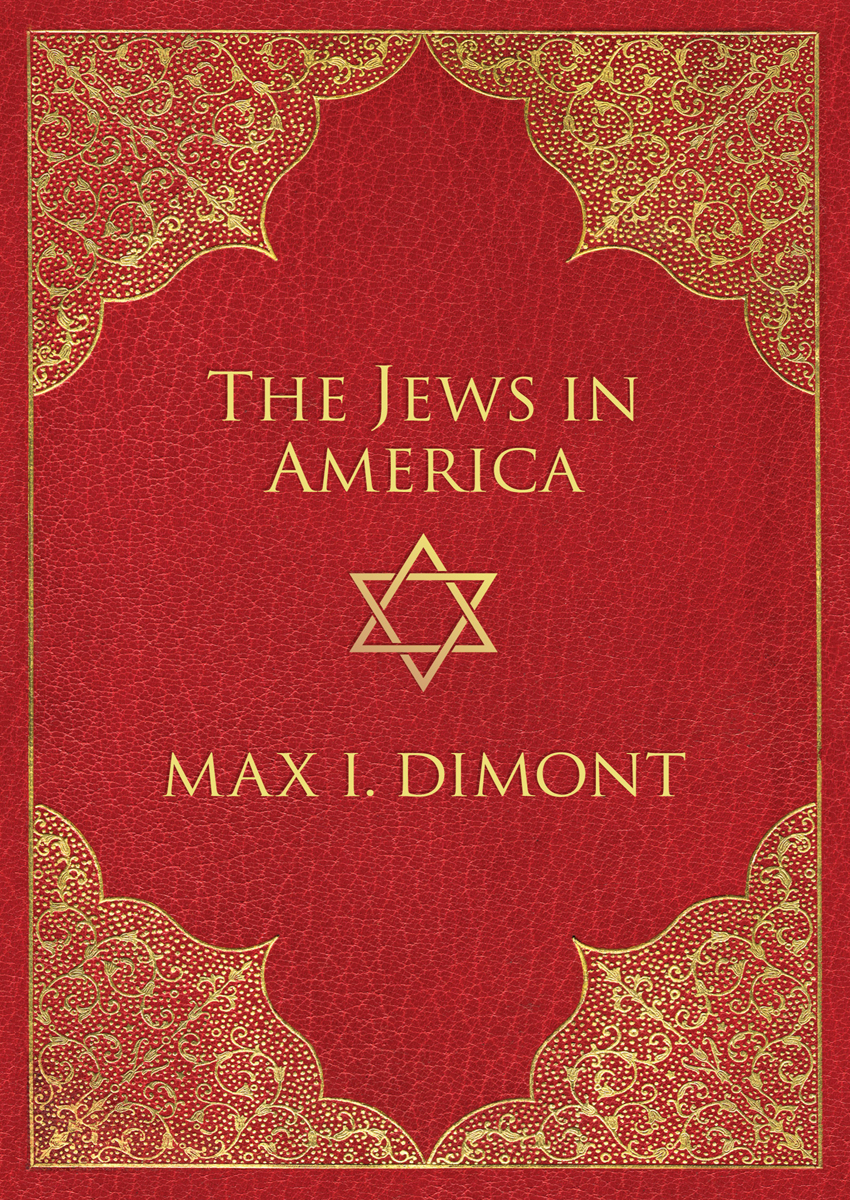Introduction
American Judaism: Wasteland or Renaissance?
The Jews in the United States are the inheritors of a four-thousand-year-old culture. Into their willingor unwillinghands, history has placed the symbolic scepter of this heritage. Will this Jewish cultureentrusted to the American Jews either by blind permutations of events or by a manifest destinywither in a wasteland of indifference? Or will there be a renaissancea humanistic rebirthto ensure this culture continued growth?
For those who view purist Orthodoxy as the only authentic Judaism, American Judaism is nothing but a wasteland. For those who see medieval concepts of Judaism vanishing and new modes of expressing ones ties to Judaism emerging, American Judaism offers a renaissance. Thus, American Judaism finds itself in a dilemma. Which view of itself should it acceptthe former, which threatens extinction, or the latter, which offers hope?
Viewed through the lens of orthodoxy, American Judaism is in grave danger. As one Jewish leader succinctly summarized the threat: Fewer than half of American-Jewish households belong to synagogues. Close to 40 percent of all Jews are marrying non-Jews (compared to 6 percent twenty years ago). Religious school enrollment has plummeted to 400,000 in the last fifteen years, down one-third from a high-water mark of 600,000.... In recent years 10,000 young Jews have been enticed into joining evangelical sects... and various other occult movements... all too often ignorant of their own rich religious and cultural heritage. It has been forecast that the forces of assimilation, lowered birth rate, and increased intermarriage will reduce todays 6 million American Jews to 4.5 million within twenty-five years.*
*Bernice S. Tannenbaum, president, Hadassah: Hadassah magazine, February, 1978.
These are shocking statistics, but we doubt that greater fertility and more diligent religious school attendance will solve the problems confronting American Jewish youth as long as it remains indifferent to Judaism itself. Kaddish has been intoned on the Jewish people by Jews since the days of Moses for the laxity of their ways. Throughout the centuries, kings, prophets, and rabbis have railed against the tendency of the Jews to share their bedrooms with non-Jews in an amicable exchange of love and religion.
The Jews have survived friendly bedrooms, persecutions, expulsions, concentration camps. But there was always a commitment to Judaism, which permitted Jewish history to march unimpeded into the next challenge. The danger to Judaism today is perhaps the absence of such a commitment, especially among Jewish youth, which is indeed all too often ignorant of their own rich religious and cultural heritage. One reason for this is that many Jewish educational institutions tend to teach how to be Jewish instead of why. Not finding an answer to the question Why? Jewish youth drifts out of religious schools into rootlessness, prey to the forces of assimilation.
One way of discovering ones roots is to read Jewish history. Yet Jewish youth is reading very little of it, perhaps because all too often Jewish history is presented as a dirge of oppression. As one non-Jewish scholar observed: One thing I could never understand about Jewish historians is why be so proud of being the victim. The sacrificial lamb does not taste good to itself. Jewish history is also all too often isolated from world events, and thus seems to float in a vacuum, unanchored by relevance. It also often tends to be a public relations history, suppressing anything thought of as unfavorable to the Jews.
In this book, as in our previous works, we have discarded the concept of Jewish history as a specialized saga of suffering so that the real Jewish history may emergerich, rebellious, and full of intellectual adventure. We have also discarded the conventional approach to American-Jewish history and based it instead on three new concepts: that American Judaism is a unique outgrowth of the American soil, shaped as much by the American spirit as by the Jewish ethic; that the early Jewish settlers in the Colonies were not devoted Orthodox Jews who came in search of religious freedom, but people who came to seek new business opportunities; and that American Judaism is destined to play the same role in the future of the Jews that rabbinic Judaism played in their past. We will also contend that American Judaism will not only preserve the Jewish heritage but will serve as a vehicle for its enrichment.
As American-Jewish history has evolved within the context of general American history, it must be evaluated within that framework. Thus early American-Jewish history and early American history must be observed as related phenomena.
Generally speaking, there are two ways of viewing the genesis of American history. One school sees the Colonial experience until the Revolution as part of British history, with American history beginning after 1776. The other sees British history ending and American history beginning with the settling of Jamestown in 1607. Though both schools can use the same dates, each will come up with totally different evaluations.
Similarly, there are two ways of viewing early American-Jewish history. The prevalent one is to see it as an extension of European Orthodox Judaism, changing only after 1845, with the arrival of the German Reform rabbis. The new, modern view is that American Judaism began in 1654 with the arrival of the first Portuguese Jews. Just as it can be held that American history began at Jamestown, and that this experience set the framework for future American history, so it can be demonstrated that the Portuguese Jews and their successor immigrants in the Colonial period set the framework for a new Jewish history.
American Judaism was shaped neither by a book nor a blueprint. It evolved not out of what was said, but out of what was done. It lived itself into existence. The Hasidic saying Judaism did not create the Jews; the Jews created Judaism describes the American phase of Jewish history, because in America the Jews themselves created their own brand of Judaism.
Because the Jews in Colonial America, like their Christian brethren, were pioneers who grew up with the country, they learned how to innovate. Like the Puritans, the first Jews to arrive in Colonial America showed a willingness to amend the nonessentials in their Judaism but to hold on to the nonnegotiable items. This gave them the same resilience that Congregationalism gave the Puritans, and for the same reason.
The spirit of the frontier influenced the Colonial Jew as much as it did the Colonial Christian. The American historian Frederick Jackson Turner stated that each time a part of the West was conquered, America experienced a rebaptism of primitivism, a revival of strength. The frontier, in Turners view, brought a continual regeneration of the primitive conditions the early Americans experienced. This perennial rebirth, this westward expansion with its new opportunities, unleashed the forces that shaped the American character.


